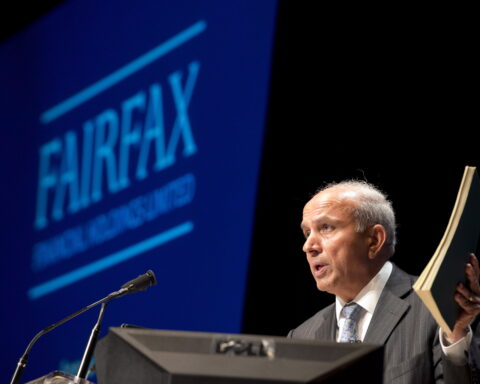After years of protest from First Nations and climate activists, the Royal Bank of Canada has agreed to an audit of its Indigenous and racial community business practices, and disclosure of key climate change data.
While these measures are a step forward, they don’t give Indigenous communities a say over the financing of particular projects or exclude new fossil fuel financing – two key demands of the bank’s critics. But these concessions do open the door to dialogue with communities and investors on these critical issues.
The compromises came after weeks of negotiation with investors who supported Indigenous and Black leaders and their allies assembled at the bank’s annual general meeting in April, the largest showing of these community members at an RBC AGM.
Under an investor agreement with the British Columbia General Employees Union, the bank will appoint an independent auditor to conduct an Indigenous and racial equity audit to determine whether the bank’s business practices are consistent with human rights policies. Of critical importance to Indigenous communities is the right to free, prior and informed consent (FPIC) of projects it finances.
“A credible Indigenous rights policy must include the right to say ‘no’ and to have that ‘no’ respected,” said Grand Chief Stewart Phillip of the Union of British Columbia Indian Chiefs (UBCIC) in an email after the meeting. He noted that RBC has already acknowledged this principle in a thought leadership brief. “Reports and slogans are nice, but what really matters is action, and specifically whether the bank continues to fund projects that do not have the FPIC of impacted communities.”
The audit is part of a package of commitments made by the bank that include respect for FPIC responsibilities under the United Nations Declaration on the Rights of Indigenous Peoples. It also includes enhancement of social and environmental due diligence on client activities on Indigenous lands and communities for transactions above a certain threshold.
RBC also took a step forward on climate change disclosure under pressure from shareholder New York City Pension Fund and agreed to publish its ratio of renewable energy financing to fossil fuel financing.
The ratio – called the energy supply ratio – is an important metric that will give investors better understanding of how well aligned RBC is with goals to limit global temperature increases to 1.5ºC. It will significantly simplify how critics hold the bank to account, and how investors measure its performance.
According to BloombergNEF, global financial institutions must achieve an energy supply ratio of 4:1 low-carbon energy to fossil fuel financing this decade to keep global warming within 1.5°C. A recent report estimated RBC’s current energy supply ratio at just 0.4 to 1. The United States megabanks Citigroup and JP Morgan also agreed to disclose the same information. As three of the largest banks financing fossil fuels in the world, this disclosure is expected to have major impact.
“As leading public investors, we expect that energy supply ratio disclosure will become a new standard for the banking sector,” says Brad Lander, the New York City comptroller, who oversees the city’s public pension funds.
Further to these changes, RBC agreed earlier this year to triple its renewable energy financing to $15 billion by 030.
As Canada’s biggest bank and the eighth largest in the world, RBC co-finances a broad range of projects and companies in pipelines and petrochemicals, two of the largest fossil fuel sectors. Many of these projects have galvanized local and international opposition because they have been built without community consent, or threaten to accelerate carbon dioxide emissions, air and water pollution and damage to forests, waterways and wildlife.
At its annual meeting last year, the bank required Chiefs and other Indigenous community members to watch and participate from a separate room, prompting accusations of ‘segregation.’ This year, community members who represented shareholders or who held proxies for investors were allowed to participate in the same room as management and directors but their comments were restricted to one minute, a limit that community members found disrespectful and insulting.
A credible Indigenous rights policy must include the right to say ‘no’ and to have that ‘no’ respected.
– Grand Chief Stewart Phillip of the Union of British Columbia Indian Chiefs
“You travel all that way to look them in the eye, tell them your truth, make sure they understand exactly what their money is doing to us, to the democracy of this country, and to climate change,” says Chief Na’Moks, a hereditary chief of the Wet’suwet’en First Nation in northwest British Columbia, in an interview after the meeting. “And then they give you 60 seconds to speak on it.”
RBC led a syndicate of banks in 2019 providing $6.1 billion to finance the Coastal Gaslink Pipeline in northwestern British Columbia without the consent of the Wet’suwet’en chiefs. The project, now nearing completion, threatens a vast swath of wild habitat and will dramatically increase greenhouse gas emissions.
Opponents of a number of other American and international projects co-financed by RBC with other banks also spoke at this year’s AGM. This included the Enbridge Line 3 gas pipeline in Minnesota, the Mountain Valley Pipeline in Virginia, the East Africa Crude Oil pipeline in Uganda and Tanzania and a proposed new plastics plant in the primarily-Black, heavily-polluted community of St. James, Louisiana.
In the meeting, RBC chair Jacynthe Côté said the bank instituted the one-minute policy to give a broader group of shareholders and proxy holders an opportunity to ask questions. “After the last AGM, we’ve been hearing voices of shareholders, and we’re going to listen and hopefully again do better next year,” Côté said.
Phillip says RBC’s actions to limit participation at its annual meeting were “deplorable,” adding it’s now up to the bank to demonstrate whether it is serious in addressing Indigenous and racial rights and climate change.
What Phillip is suggesting – an effective veto over financed projects – is a far-reaching action that would establish limits on RBC’s right to approve millions – perhaps even billions – of dollars in new project financing.
The investor agreements represent “positive steps in the right direction,” he says, but there is still a long way to go. “What matters now is whether and how it changes RBC’s decisions, which can directly determine the health and wellbeing of communities and the planet.”
Eugene Ellmen writes on sustainable business and finance. He is a former executive director of the Canadian Social Investment Organization (now Responsible Investment Association).







